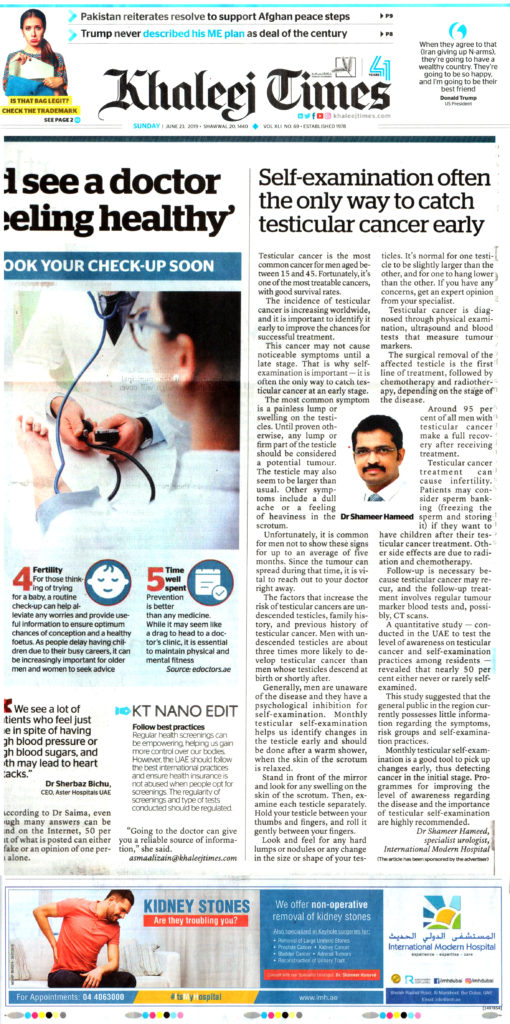Testicular cancer is the most common cancer for men aged between 15 and 45 Fortunately, it’s one of the most treatable cancers and with good survival rates. The incidences of testicular cancers are increasing in incidence worldwide. It is important to identify testicular cancer early to improve the chances for successful treatment.
This cancer may not cause noticeable symptoms until a late stage. That is why self-examination is so important – it is often the only way to catch testicular cancer at an early stage .
The most common symptom is
- a painless lump
- swelling appearing on the testicles.
Until proven otherwise, any lump or firm part of the testicle should be considered a potential tumor. The testicle may also seem to be larger than usual. Other symptoms include a dull ache or a feeling of heaviness in the scrotum. Unfortunately, it is common for men not to reveal about these signs for up to an average of 5 months. Since the tumor can spread during that time, it is vital to reach out to your doctor right away.
The factors that increase the risk of testicular cancers are
- Undescended testicles
- Family history
- previous history of testicular cancer
Men with undescended testicles are about three times more likely to develop testicular cancer than men whose testicles descend at birth or shortly after. Generally men are unaware about the disease and they have a psychological inhibition for self-examination. Monthly testicular self-examination helps us to Identify changes in testicle early and should be done after a warm shower,when the skin of the scrotum is relaxed. Stand in front of the mirror and look for any swelling on the skin of the scrotum and then examine each testicle separately.
Hold your testicle between your thumbs and fingers and roll it gently between your fingers.
Look and feel for any hard lumps or nodules or any change in the size,shape, or consistency of your testicles.
It’s normal for one testicle to be slightly larger than the other, and for one to hang lower than the other. If you have any concerns, get an expert opinion from your specialist.
Testicular cancer is diagnosed by
- the physical examination
- ultrasound
- blood tests that measure tumor markers.
Surgical removal of the involved testicle is the first line of treatment followed by chemotherapy and radiotherapy depending on the stage of the disease. Around 95 % of all men with testicular cancer make a full
recovery after receiving treatment. Testicular cancer treatment can cause infertility. Patients may consider sperm banking (freezing sperm and storing it) if they want children after their testicular cancer treatment. Other
side effects are due to radiation and chemotherapy.
Follow-up is necessary because testicular cancer may recur. Follow-up treatment involves regular tumour marker blood tests and possibly CT scans.A quantitative study conducted in the UAE in efforts to test the level of awareness regarding general knowledge on testicular cancer and self- examination practices among residents revealed that nearly 50% either never or rarely self-examined. This study suggested that the general public in the region currently possesses little information regarding the symptoms, risk groups and self-examination practices Monthly testicular self-examination is a good tool to pick up changes in testicle early and thus detecting cancer in the initial stage. Programs for improving the level of awareness regarding the disease and importance of testicular self-examination is highly recommended.
Dr. Shameer Hameed
MBBS, MS (General Surgery), DIP. LAP, MCh (Urology) FECSM (Sexual Medicine)
Specialist Urologist writes in Khaleej times and now available in our blog.
